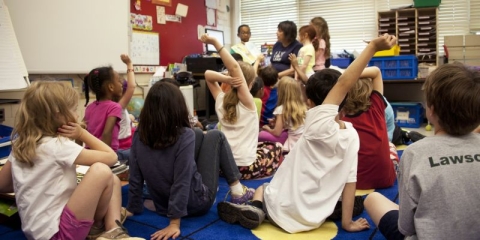

Children described as more impulsive and less focused by their teachers are also more sensitive to classroom noise a new study shows
25 July 2022
3 min read
Research from the University measured children’s reactions to classroom noise and found that pupils at risk of school difficulty are also the ones more likely to be annoyed and easily distracted by noise.
The study which was published this week in the International Journal of Environmental Research and Public Health measured the impact of noise on over 350 children aged between 7-11 years old.
Environmental noise is one of the main sources of pollution in today’s modern world. The health effects associated with noise depend on both environmental exposure and individuals noise sensitivity. However, studies to date have focused predominantly on adults. Until now - little is known as to why some children are more sensitive to noise than others.
This new study used a detailed questionnaire to collect children’s reactions to classroom noise. Pupils were given fourteen statements related to noise for example - “when you do an activity alone in the classroom, if noise catches your attention you lose track of your thoughts”. The children were then asked to indicate how often this happened to them, by responding using a 4-point response scale: (1) almost never, (2) rarely, (3) quite often, (4) very often.
Interventions aimed at reducing classroom noise and improving effortful control might be particularly beneficial for the most noise sensitive children
Dr Jessica Massonnié, School of Education, Languages and Linguistics
These reactions to classroom noise were then linked to children’s temperament, as reported by the children’s teachers. Teachers were given seventeen statements about each child’s attentional focus, impulsivity, behavioural control and ability to engage in school work, for example - “pays attention”, “says the first thing that comes to mind”. Teachers were asked to indicate how true these statements were considering the child’s behaviour over the past two weeks, using a 5-point response scale ranging from (1) almost always untrue, to (4) almost always true. All these aspects of children’s temperament reflect their effortful control. Effortful control underlies children’s capacity to adapt flexibly to social demands and in particular to regulate their attention and behaviour.
The results of this study showed a correlation between those children who were identified by teachers as struggling with effortful control and those children who admit negative attitudes towards noise – in particular more difficulties hearing someone talk, more distraction and more annoyance from noise. Results show that these children accumulate multiple risks to learning – they are more likely to have difficulties engaging with school work, staying still and focussing, while at the same time being more vulnerable to distractions.
Dr Jessica Massonnié, School of Education, Languages and Linguistics, says: “Our findings are important because they question the assumption that children who are perceived as difficult to engage in schoolwork 'do not care' about distractions' –they do particularly care. These children report being more annoyed and easily distracted by noise. The danger is that these children who are already being labelled as less focused will face a downward spiral if noise levels in classrooms are not controlled.
“Interventions aimed at reducing classroom noise and improving effortful control might be particularly beneficial for the most noise sensitive children.”
Dr Jessica Massonnié was supported by her collaborators from Birkbeck University of London and the University of Surrey.
